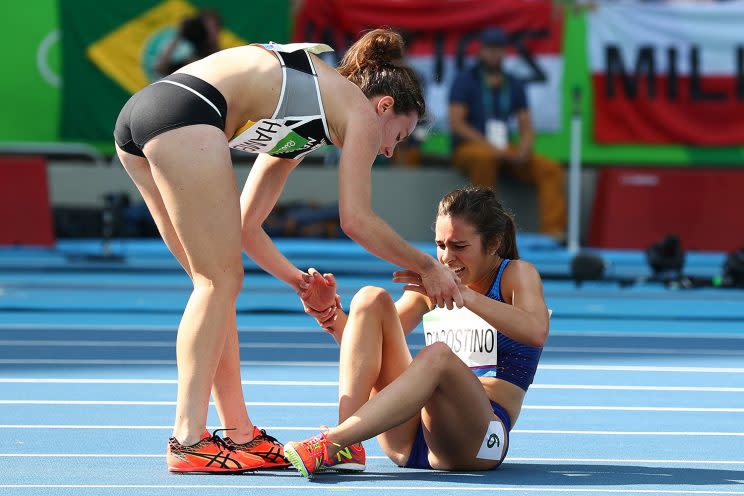Nikki Hamblin's 5,000-meter finish belies truth: She and American Abbey D'Agostino are winners

RIO DE JANEIRO – Nikki Hamblin bore the scars of the crash: a circular scrape on her right shoulder, two spike marks on the back of her right thigh, kinesio tape on her aching right Achilles and ankle.
It might have been the most rewarding thing that ever happened to her.
Hamblin got up from that crash in the 5,000-meter run Tuesday. She got up with the assistance and urging of American Abbey D’Agostino, who had fallen over her in a flurry of tangled feet and bodies. For some reason, American D’Agostino thought of New Zealander Hamblin in a moment that normally is every competitor for herself.
She went and put her hand on Hamblin’s shoulder and told her to get up.
But then it was D’Agostino’s turn to go down shortly thereafter, and Hamblin’s turn to help her to her feet. One generous deed leading to another. And thus two women who had never met and would not win medals became linked in the lore of Olympic spirit.
“You can make friends,” Hamblin said, “in the moments that really should break your heart.”
Which is one of the greatest snippets of wisdom you’ll ever hear in an Olympic mixed zone interview area.
Hamblin uttered that sentence after finishing last in the 5,000 final Friday night. A distant last at that. She was lapped with more than 400 meters to go. She was hobbled by the ankle she turned in that crash Tuesday.
[Related: U.S. women’s 4×100 team overcomes DQ to win gold medal]
“You can’t choose what happens to you, but you can choose what you do about it,” Hamblin said. “So I wanted to be brave and go out and run in an Olympic final and try my best.
“If you only care about your results, that really limits you. Say you race 10 times a year in the 1,500, that’s 40 minutes. You can’t let that define you.”
Hamblin’s more familiar event is the 1,500, which she ran earlier in Rio and finished 30th. She indeed tried her best in the 5,000, but simply was no match for the armada of Africans who blazed past everyone and onto the medal stand.
Still, she was better off than D’Agostino, who watched the 5,000 final from the stands of Olympic Stadium. She suffered a torn ACL and torn meniscus in that Tuesday fall, yet somehow finished the race. There have not been many greater examples of athletic bravery than that.
“I still am in disbelief over how she finished,” Hamblin said. “I cannot understand how she did that.”
The two were advanced by judges’ decision to the final of the 5,000 because of the crash that compromised their chances in the preliminary. They also advanced an ancient Olympic ideal that has been under siege here in Rio, amid all the sound and fury about doping and Ryan Lochte’s night out. They improbably became a duo who lifted the Games amid injury and defeat.
They lived out one of the core tenets of sport: if you fall down, get back up. And they lived out one of the core tenets of humanity: help those in need. Those giant lessons sprang from an instantaneous decision amid considerable duress and hardship.
[Featured: Why Phelps says he’s retiring for good this time]
Hamblin said she has not gone back and studied the race and really watched the fall. She may do that, but not immediately. She’s still processing becoming an international story.
The day after she and D’Agostino came to each other’s aid, the two made 10 television appearances in a four-hour period. The highlight was “Good Morning America,” which asked the women if they would prefer hair and makeup work or a pre-show meal.
“We said, ‘Can we have both?’ “ Hamblin said with a laugh. “So we were eating and having our hair done at the same time. It was awesome.”
Very much by circumstance, two women four years apart in age – Hamblin is 28, D’Agostino 24 – and half a world apart in distance have been thrown into a sudden friendship.
“I think we will keep in touch,” Hamblin said. “She’s young and so talented, and she’ll be here in four years, and probably here again four years after that.”
And if Abbey D’Agostino returns to the track and returns to this stage, she will forever have a New Zealander cheering her on.
“I’m never going to forget that arm on my shoulder,” Nikki Hamblin said, beaten and scraped and victorious all at once.


